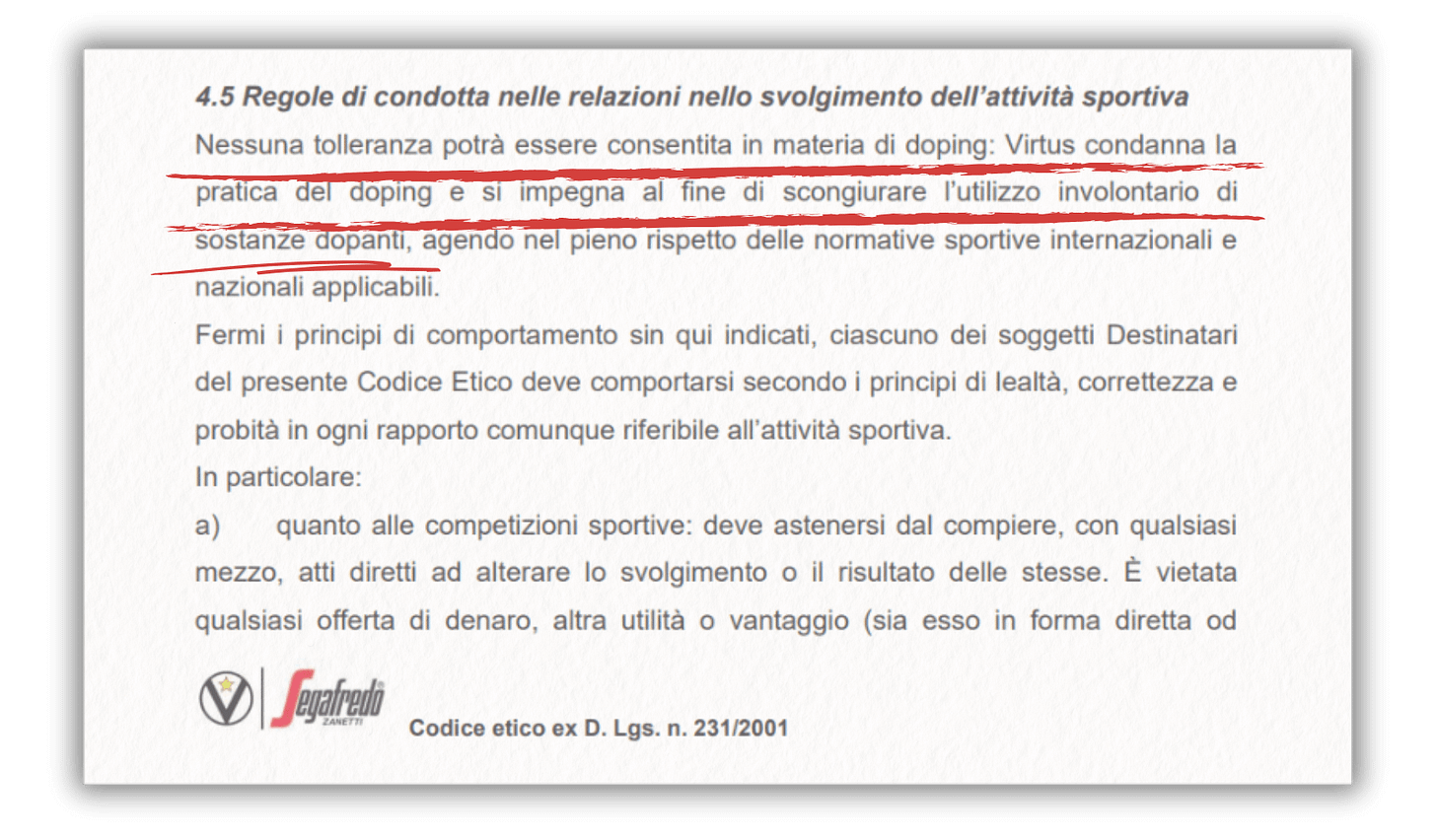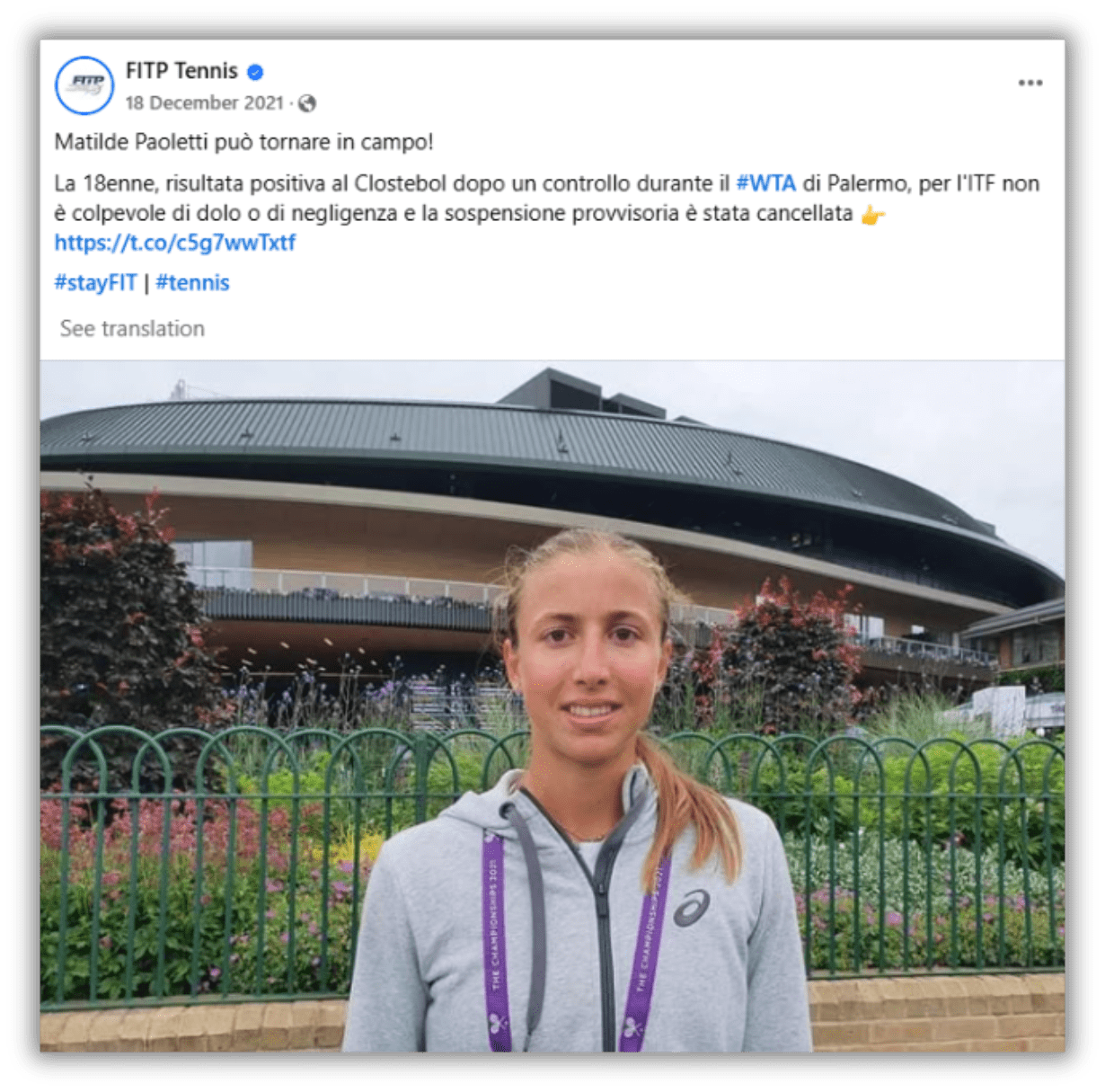Exclusive: Sinner's ex-physio 'followed' Code of Ethics to avoid inadvertent doping cases at Italian basketball club
Prior to joining Jannik Sinner's team, the physio Giacomo Naldi worked in Italian basketball. At least one player on his team was already aware of a rival's case, involving clostebol contamination.

Every Monday and Thursday, I send a newsletter to your inbox with the URLs to all the major doping stories in the press over the past seven days.
If you are a journalist who would like to report on this story, please provide a clickable link in your article. Thank you.
Jannik Sinner’s former physio Giacomo Naldi, whose actions led to the world number one twice testing positive for the anabolic steroid clostebol, was obligated to prevent athletes from inadvertently consuming doping substances during his time working for one of Italy’s most successful basketball clubs, Honest Sport can reveal.
In 2022, at least one basketballer at the club Virtus Bologna, which employed Naldi at the time, was aware of a case involving a rival team’s player who had tested positive for clostebol after inadvertently coming into contact with a third party who was using a ‘Trofodermin’ spray containing the steroid.
The player who tested positive has described Sinner’s case as ‘identical’ to his own.
Naldi is yet to respond to inquiries from this outlet. Sinner said, during his case, that his ‘attention has never been drawn specifically’ to the risks of clostebol contamination.
An Honest Sport investigation has also found that the Italian Olympic doctor at the Paris 2024 Olympics recommended another Italian basketballer to use a Trofodermin spray which caused him to consequently test positive for clostebol, in what was the second doping case of the player’s career.
Shortly after disclosure of Sinner’s case last year, Giacomo Naldi told the Italian media outlet Leggo that he hoped to shed further light on the case which he believed portrayed him as the ‘only culprit’.
Tomorrow, Sinner returns from a three-month suspension to play in the first round of the Rome Masters 1000 tournament.

On 10th March and 18th March 2024, the world number one tennis player Jannik Sinner twice tested positive for clostebol at the Indian Wells and Miami Masters 1000 tournaments in the USA. An independent tribunal accepted that Sinner had absorbed the drug during massages performed by Naldi who had been using a clostebol spray, called ‘Trofodermin’, to treat a cut on his finger.
Naldi was recommended the product by Sinner’s ex-physical trainer Umberto Ferrara, who now works with the Wimbledon finalist Matteo Berrettini. It is established that Ferrara bought the spray at the Trinità Pharmacy in Bologna, Italy, before travelling to the United States. He says he purchased the drug to treat a chronic condition.
“There is no question that Jannik is innocent in this case. The ITIA [International Tennis Integrity Agency] did not challenge that key principle. However, under strict liability rules Jannik is responsible for whatever is in his system, even when entirely unaware of it, as in this exceptional case,” read a statement released by Sinner.
In 2020, scientists from Rome’s WADA-accredited laboratory conducted a series of controlled experiments which showed that athletes can test positive for clostebol by shaking hands with another individual who has recently used Trofodermin.
The laboratory was also able to detect clostebol in the participants’ urine samples for between 2 and 11 days following absorption, or administration.
After Sinner’s two failed tests, the Polish Olympic canoeist Dorota Borowska, who was training in Italy at the time, tested positive for clostebol after treating a wound her dog had sustained with Trofodermin. The Italian tennis player Marco Bortolotti also inadvertently tested positive for the drug in 2023.
In the vast majority of clostebol cases in Italy, the athletes have been cleared of any intent to cheat. Therefore, there is no suggestion of wrongdoing on behalf of these individuals, including Jannik Sinner.
“An apparent doping steroid, a fake doping. And the first to know that it is a harmless substance if in small and irrelevant quantities as in the case of Sinner, and easily transmissible, are those responsible for anti-doping,” said the respected anti-doping campaigner Sandro Donati about clostebol.
On the other hand, Luis Horta, the former director of the WADA-accredited laboratory in Lisbon, has previously raised concerns that Trofodermin may be used as a doping agent.
“I suspect that they use creams. Because creams as clostebol, or testosterone by cream or by gel. The detection window it's very, very short. It's sometimes some hours, then it's a good way to dope,” Horta told Honest Sport.
In May 2024, the International Cycling Union suspended the Team Banco Guayaquil-Bianchi team for twenty days after two of its riders failed doping tests, one for erythropoietin (EPO), the other clostebol, within 80 days of each other. The team’s general manager Víctor Hugo Peña rode for the US Postal cycling team and worked with Lance Armstrong’s doping doctor Michele Ferrari, from Italy, during his career.
In Italy, Trofodermin is sold over the counter in pharmacies for as little as twelve euros, and as such the packaging of the product is emblazoned with a red warning sign that the spray contains a doping substance prohibited for use by the World Anti-Doping Agency (WADA).
Naldi claims that the clostebol product, recommended to him by Umberto Ferrara, had been removed from its packaging and he was therefore unaware the spray contained an anabolic steroid. Naldi also testified that he did not read the label which clearly states Trofodermin contains ‘clostebol acetate’ – a prohibited substance.
“The canister of Spray had previously been removed from its packaging. Mr Naldi admits that he did not check the contents of the Spray or see that present on the label of the canister was ‘Clostebol’. Mr Naldi states that he had no knowledge that the Spray contained Clostebol,” reads the decision.

Sinner himself told the tribunal that he ensured ‘his entourage was educated about anti-doping, including not to Use Prohibited Substances when treating him’.
Honest Sport can now reveal that Naldi acted in such a manner even though he was required to ensure athletes did not inadvertently fail doping tests while working in Italian basketball.
From July 2017 to January 2023, Naldi was employed as a physio at the Virtus Bologna professional basketball club. Virtus Bologna have won 16 Italian league championships, second only to Olimpia Milano, and two EuroLeague titles, the most prestigious club basketball tournament in Europe.
As a member of the club’s ‘medical staff’ and a contracted ‘employee’, Naldi was obliged to follow the Virtus Bologna ‘Code of Ethics’ and in doing so prevent the club’s players from involuntarily using prohibited substances.
“Virtus condemns the practice of doping and is committed to preventing the involuntary use of doping substances, acting in full compliance with international sports regulations and applicable nationals,” reads section 4.5 of the Code of Ethics. “No tolerance will be allowed in the matter of doping.”
The regulations were approved by the Virtus Bologna board of directors in September 2020. The document also states that it would ensure that ‘the Code’ was disseminated to all the club’s staff with corresponding confirmation of receipt.
"With respect to the Recipients, the Company's top management undertakes to: implement adequate training and awareness programs on the contents of the Code," states section 2.
Nevertheless, fourteen months after Naldi left Virtus Bologna, Jannik Sinner inadvertently failed two doping tests.

Sinner, who initially avoided a suspension from the International Tennis Integrity Agency (ITIA), was suspended for three months after WADA appealed the decision. Both parties reached a ‘case resolution’ agreement several weeks before the case was due to be re-heard at the Court of Arbitration for Sport.
WADA considered Sinner to be responsible for the actions of his entourage, which in this case included Giacomo Naldi and Umberto Ferrara, who were said to have acted negligently.
“WADA has confirmed and agreed that the athlete's scenario is scientifically plausible and well-supported by facts. Given his specific facts, a twelve-month sanction would have been disproportionately severe,” stated WADA’s press department. “WADA accepts that Mr. Sinner did not intend to cheat, and that his exposure to clostebol did not provide any performance-enhancing benefit.”
Lars Mortsiefer, a board member of the German anti-doping agency, told the Frankfurter Allgemeine Zeitung that he struggled to understand how WADA’s regulations allow for an athlete, in this case Sinner, to test positive for anabolic steroid and avoid a sanction of less than one year.
“Under current regulations, a reduction of less than one year of suspension is generally not permissible,” said Mortsiefer.
Indeed in 2022, the Italian national team basketballer Riccardo Moraschini was suspended for one year after testing positive for clostebol under what the player describes as ‘identical’ circumstances to Sinner.
In October the previous year, Moraschini inadvertently absorbed clostebol after coming into contact with a third party, his partner, who had applied Trofodermin spray to a cut on their finger after being recommended the drug by a pharmacist.
In Sinner’s case, the player inadvertently absorbed clostebol after coming into contact with a third party, his physio, who had applied Trofodermin spray to a cut on their finger after being recommended the drug by his physical trainer, a self-described ‘chemist pharmaceutical’.
“There is not even a thin thread between my story and this one of Sinner. It is exactly the same identical situation. But evidently managed in a totally different way in every way. Here is the world and the objectivity of the doping and anti-doping system,” wrote the Italian basketballer on the social media platform X.
The negligence demonstrated by Sinner’s ex-physio Giacomo Naldi, whose actions Sinner was responsible for as per WADA regulations, is harder to understand given his experience working in Italian basketball, which is well familiar with clostebol cases.

In 1998, La Stampa reported that the Italian Olympic doctor at the Paris 2024 Olympics Andrea Billi ‘prescribed’ Trofodermin spray to the Italian basketballer Mario Boni to treat an infection on his big toe.
Boni, who used the spray twice a day for four days, tested positive for clostebol. Despite testing positive for another anabolic steroid, nandrolone, four years earlier, Bini was cleared of intent to cheat. There is therefore no suggestion of wrongdoing on behalf of Dr. Andrea Billi.
“The analysis has shown that the quantity of anabolic is compatible with the use of the spray, excluding that the Clorebol [sic] was taken in another form,” reads the article.
According to his Curriculum Vitae, Andrea Billi was the team doctor of the Italian Men’s Italian National team from 1998 to 2015. He was also the Italian Olympic Committee doctor at the Tokyo 2020 and more recently at Paris 2024.
Moraschini, who overlapped with Dr. Billi in the national team in 2014 and at the Tokyo Olympics, later tested positive for clostebol as did his teammate at Olimpia Milano Christian Burns, who also played for Italy. Burns was cleared of wrongdoing.

Giacomo Naldi is yet to respond to inquiries asking whether he was aware of the Olimpia Milano cases prior to Sinner testing positive, and therefore why he did not take an extra precaution concerning the drug.
However, Honest Sport has now found that at least one basketballer on the Virtus Bologna team, who employed Naldi at the time, was aware of Moraschini’s case.
On 3rd January 2022, Moraschini announced on Instagram that he had been suspended by the Italian anti-doping agency.
“It all comes from indirect contamination, that is, from contact with a person who was using, without my knowledge, a healing spray containing the substance (purchased in a pharmacy on the advice of the pharmacist himself...),” read the Instagram caption.
Under the post, the Virtus Bologna player Marco Ceron posted three heart ‘emojis’ which Moraschini duly replied to. Moraschini played for Virtus Bologna from 2007 to 2013 before later playing for Olimpia Milano.
Two days after the post, on 5th January, Virtus Bologna played Olimpia Milano at the Mediolanum Forum arena. Several months later in the championship finals, the pair played a further six times. Both clubs’ players and staff were obviously well-known to each other.

While Naldi may have been unaware of Moraschini’s case - and its intricacies, Sinner’s former physio Umberto Ferrara reiterated to Gazetta dello Sport last month that he still warned Naldi that Trofodermin contained a prohibited substance.
“I was very clear in communicating to Naldi the nature of the product and the need for it not to come into contact with Jannik for any reason,” said Ferrara.
In October last year, Giacomo Naldi told the media outlet Leggo that he was not the only party responsible for Sinner’s failed drug tests.
“I hope that, sooner or later, I can tell what happened to shed some light because the current interpretations make me look like the only culprit, but that's not the case," said Naldi.
In previous cases, the ITIA has fought for more harsh sanctions when players, and by extension their entourage, are aware of a recognised contamination problem.
In 2023, the Brazilian player Gilbert Klier was banned after testing positive for the anabolic agent ostarine after consuming contaminated supplements produced in a compound pharmacy. In Klier’s case, the ITIA served the player with a one-year suspension because the agency, and the International Tennis Federation, had specifically warned Brazilian players about these supplements.
“The Player could not assume that he was avoiding that risk in January 2022 in using what he thought was a reputable compound pharmacy based on cursory checks. To the contrary, he voluntarily assumed that risk,” read the decision.
Jannik Sinner said, as per the decision in his case, that his ‘attention has never been drawn specifically’ to the risks of clostebol contamination.
The ITIA confirmed to Honest Sport that it has never sent a formal warning to players that Italy has a recognised clostebol contamination problem. The agency also does not email players every time a player is suspended for doping.
Nevertheless, four months prior to Sinner’s case, the ITIA publicly announced, on its website and Twitter account, that the Italian player Stefano Battaglino had been suspended for four years after testing positive for clostebol. Battaglino says he overlapped with Sinner at the Piatti Tennis Academy. He was photographed at the centre in 2018, as per a post on Instagram.
In 2021, the Italian teenage tennis players Mariano Tammaro and Matilde Paoletti also inadvertently tested positive for clostebol. The Italian Tennis Federation (FITP) announced the conclusion to Paoletti’s case, who trained at an Olympic training centre, on its own Facebook page.
The FITP, nor the Italian anti-doping agency, is yet to clarify whether they took proactive measures to stop players from testing positive for clostebol prior to Sinner’s case. The German anti-doping agency has since actively warned athletes about the dangers of clostebol sprays.
Tomorrow, the world number one plays in the first round of the Rome Masters 1000 tournament in his homeland Italy, where he has been welcomed by the FITP President Andrea Binaghi.
Binaghi said last week, “The world is populated by idiots and envious people, and Sinner has noticed this in recent months.”

If you are a journalist who would like to report on this story, please provide a clickable link in your article. Thank you!
If you would like to share this article on social media please share the following proxy link as Twitter and Facebook suppress Substack URLs because it is a competing platform:
https://substack-proxy.glitch.me/articles/honestsport-substack-com-p-exclusive-sinners-ex-physio-followed.html
Please give this post a ‘Like’ if you enjoyed it - it helps with the algorithm.
I have undertaken major doping investigations for British newspapers (link) and international broadcasters such as ITV and ARD. For discussions regarding potential doping investigations at your news organisation, please contact honestsport@substack.com.






Hi Edmund, thanks for this article. I have always thought both Sinner staff were truly negligent so this story is all the more galling.
In relation to the comparisons between the Sinner case and the basketballer (Moraschini) the comparisons quoted by others in the article that it’s a similar case needs some care (this is seperate from you’re own valid point about Naldi’s expected knowledge of closterbol risks from antiseptic sprays based on the basketballer case years before).
Although there does not appear to be any reported decision in the Moraschini case - it appears to have been decided by NADO and by reference to the WADA code as well — it was found by the Tribunal in that case (accordingly to other reporting of its findings) that the tribunal found that he should have been aware of the risk, leading to the 1 yr suspension. This would imply, unlike in the Sinner case, that the first instance tribunal found him to 1) have know that his fiancée was using the spray hence why he should have been aware of the risk and thus 2) found to have no significant fault/negligence (hence the 1 yr). This is different to the Sinner case where the independent tribunal found he did not know Naldi used the spray or that Ferraro gave Naldi the spray and thus he bore no F/N. I appreciate that WADA’s agreement with Sinner subsequently for 3m to reflect player responsibility for his staffs’ negligence cuts against that but I think that needs to be understood in the context of the use of the settlement clause (A 10.8.2) of the WADA code. There is debate on the interpretation of that clause and whether it allows flexibility to depart from the mandatory 1 yr suspension and its not settled. So whilst Lara Mortseifer says a reduction of less than one year suspension is “generally” not permissible, that does not account for the debatable construction of A 10.8.2 (which will become moot with the proposed changes to the new WADA code that will allow suspensions of less than 1 year for contamination by a third party).